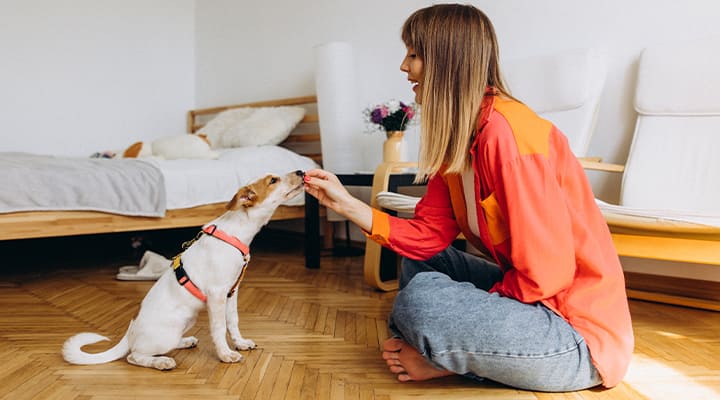
Does My Dog Need a Multivitamin?
Published: October 2023
Few things in life are as special as lying down with your dog—even if it means getting your clothes full of hair—and listening to their heart, knowing it beats for you. It's natural that as "pet parents," we want the best for our furry friends. And proper nutrition is one of the cornerstones of head-to-tail wellness.
Like us, our dogs have specific nutritional needs, including protein (which contains canine-crucial amino acids), carbs, fats (the "good" kind, aka omega-3 fatty acids—yes, your dog needs them, too!), probiotics and more.
So, how can you optimize your dog's nutritional status for health and activity, especially as they age? Finding a high-quality supplement that complements a high-quality dog food can be a proactive way to help your pooch stay healthy for many years of adventures, cuddles, mischief and everything in between! Your trusted vet can help you choose a high-quality supplement for your dog's daily routine to help your pooch be their healthiest self in the long run.
But with all the dog vitamins available in the market, how do you choose quality active ingredients that support their overall health? Here's the scoop.
Should I give my pooch a dog vitamin?
Since most quality commercially available dog foods do contain the right balance of nutrients for canine health, the answer to this question is a bit more complex than a simple yes or no.
Yes, you should give your pooch a dog multivitamin to help them feel woof-tastic all day, every day—but only if they need help with meeting the required nutrition in their meals. Just as when you choose to add supplements to your regimen, adding a multivitamin to your dog's daily routine should complement their diet. You choose supplements like vitamin A or vitamin C to meet specific health needs—the same goes for your dog; your vet can help you choose dietary supplements that will help them meet their health needs.
Here are a few reasons why you might want to give your dog supplements:
- Your dog is a picky eater and doesn't finish what's in their bowl—or is too full to finish it because they nibble at table scraps.
- You feed your dog home-cooked meals rather than a veterinarian-approved dog food. Don't get us wrong—those meals can be very nutritious! But it may be harder to ensure that you're providing the right balance of nutrients when you're serving from a pot or pan and not a canister. Additionally, B vitamins from food are not easy to absorb, which is why a multivitamin offers good backup.
- You want to be extra sure your dog's nutritional bases are covered—hey, being proactive is never a bad idea!
Another key factor to consider is your dog's age. As a young puppy (because all dogs are puppies in our eyes), your dog's metabolism and overall health will function optimally. In other words, just like when we're younger, your puppy's body is adept at digesting their dog food and absorbing the nutrients they need to maintain several aspects of their well-being, including immune system health, joint health and comfort, a shiny coat, healthy skin and beyond!
Top 3 benefits of dog multivitamins
A dog multivitamin complements your dog's balanced meals, delivering essential nutrients they need to be in their best tail-wagging health. When selecting a dog multivitamin, look for these key benefits:
1. General well-being:
Dogs' health (like ours) is multidimensional, so ensuring they get enough of the vitamins and nutrients they need is essential to support several aspects of their overall health and keep those happy tails wagging.
2. Digestive support:
Your dog loves a good tummy rub—and a tummy that feels good all the time! Plus, a dog's immune system and overall health depend on their gut health (thanks to that gut-mind connection). Supporting digestion with nutrients like probiotics is a proactive way to encourage not just digestive health, but also a healthy immune response and beyond!
3. Immune system health:
We all want our furry friends to live long, healthy lives—and a healthy immune system is crucial for their lifespan and quality of life. A high-quality dog multivitamin helps support their immune response, especially as those gray hairs start to show up, helping them combat immune challenges as they age! Look for added beneficial ingredients, such as colostrum.
What’s in a dog multivitamin?
As the name suggests, a dog multivitamin contains, well, vitamins, and multiple ones at that! Many dog multivitamins will have the following ingredients (which you'll also find in most commercial dog food formulas):
Vitamins
Fat-soluble vitamins—Fat-soluble vitamins depend on bile acids for absorption. Pro tip: these vitamins are stored in your dog's body, so never give more than the recommended dosage.
Vitamin A:
You may also know it as retinol; vitamin A plays a vital role in growth and development, reproduction, eye health and function, skin and immune system health.Vitamin D:
The sunshine vitamin is essential because dogs can't produce it naturally in their bodies. Vitamin D is critical for supporting digestive health and absorbing nutrients like calcium and phosphorus for healthy, strong bones.Vitamin E:
If you take vitamin E yourself, it's probably because you know it as a powerful antioxidant, and that's precisely the role this vitamin plays in your dog's health. Vitamin E helps protect cells from oxidative stress, supporting your dog's immune system, cognitive health and even coat health.Vitamin K:
This vitamin is involved in healthy blood clotting and bone development.
Water-soluble vitamins—These vitamins (mostly B vitamins, the same ones that are probably in your B-complex!) are readily absorbed and used by your dog's body, and because they are water-soluble, they are easily excreted. That makes being consistent with dosage key.
Thiamine (B1):
Thiamine plays a critical role in many enzymatic reactions in your pooch's body, supporting cardiovascular and nervous system health, a healthy appetite and weight, muscle strength and more.Riboflavin (B2):
Riboflavin is essential for brain health, vision, heart health and more.Pyridoxine (B6):
Vitamin B6 plays a crucial role in amino acid metabolism and other body systems like kidney function and muscle strength. Pyridoxine is even involved in neurotransmitter production (yes, dogs have neurotransmitters, too!).Niacin (B3):
Your dog needs niacin to support several enzymatic and physiological pathways that keep them tail-wagging-healthy, especially as they (gracefully) age. When your dog doesn't have enough niacin, it can affect their tissue and skin health, cognition and oral health.Pantothenic acid (B5):
Vitamin B5 is vital for your dog's digestive and reproductive health. It also supports the metabolism of fats, proteins and carbohydrates, and it's necessary for healthy energy production. B5 also works with other pathways that regulate weight management, immune system function and heart health.Cobalamin (B12):
B12 is a superstar at supporting several pathways involved in your dog's health and cellular function. It's even necessary for healthy folate metabolism—needless to say, B12 is paws-itively a star player in a balanced diet.Folic acid (B9):
Everyone needs folic acid to stay healthy, and dogs are no exception. At a cellular level, your dog needs B9 for healthy DNA synthesis.Biotin (B7):
Your dog needs biotin for healthy metabolism of fats, sugars and amino acids, and it's paw-some at supporting healthy skin and coat health.Choline:
Ok, this one is not a vitamin, but this essential nutrient is involved in regulating fat absorption in the liver and plays an important role in clotting and a healthy inflammatory response.
Additional nutrition support
Aside from vitamins, many comprehensive supplements can include other active ingredients to enhance the health benefits.
Probiotics:
Probiotics support the healthy bacteria in your dog's gut. Probiotics are important for promoting digestion, and proper absorption of vitamins, minerals and other nutrients, and also support a strong immune system. Finding an all-in-one formula that also delivers probiotics is a win-win!- Colostrum: Dog multivitamins sometimes include bovine (from cows) colostrum to help support a healthy immune response and healthy digestion.
Glucosamine:
Some dog supplements include a glucosamine complex to offer joint-supporting benefits, helping your doggo stay active.Fish oil:
Omega-3 fatty acids aren't just important for your well-being—our four-legged family members also need the health-promoting benefits of fish oil fatty acids, especially for skin and coat health.
How do I know if my dog’s food has enough vitamins?
If you buy commercial dog food, it is highly likely that it's well-balanced and includes the vitamins and minerals, and the right amount of protein, fats, carbs and even fiber your pooch needs. Always read the label to get the details of ingredients and the nutritional facts in the food you buy.
However, if you decide that commercial food is not the right choice for your dog, and choose to make home-cooked meals for them, that's when something may be missing in their diet. Why? It's not easy to get the right food sources and combinations of nutrients to provide your dog with everything they need to maintain their health.
We don't blame you for wanting to pamper your pet with something made with love (and fresher ingredients) than what comes out of a bag or canister! Here's where a dog multivitamin will come in handy, helping you ensure you're meeting your dog's nutritional needs.
What age is best for dog vitamins?
The easy answer to this question is to look on the label of your dog multivitamin (or any supplement)! It likely will indicate the recommended ages and dosage. Many dog multivitamins indicate they are appropriate for dogs of all breeds, shapes and sizes over one year of age, even when they are senior dogs (or senior puppies, as we like to call them). Unless your vet says otherwise, multivitamins are generally OK for dogs throughout their adult life.
Why might older dogs need multivitamins? Just like our bodies change over time, so does your dog's body. It might feel like happens out of the blue: one day you're bringing home a fuzzy ball of energy with clumsy paws; the next, their coat is peppered with white hairs, their tummy is more sensitive, and that once frenetic demeanor is now calm. Giving supplements to a senior dog can help their body better manage the age-related changes by helping them meet their nutritional needs.
It goes without saying, though, that you need to partner with your veterinarian on any decisions about your dog's nutritional strategy! Your dog's vet can perform a thorough physical and metabolic evaluation to help you decide if you need to switch to a senior dog diet or add dog multivitamins (whether it's drops, tablets or a soft chew) to your pooch's daily routine.
Will my furry friend like dog multivitamins?
Many dog multivitamins (and other supplements) come in soft chews with tasty flavors like beef, salmon, bacon and chicken flavor, making it easy to administer daily dog vitamins (or other nutritional support supplements) they need.
Should you choose drops, tablets or soft chews? Of course, the delivery option depends on the type of dog multivitamin or supplement you're getting for your precious furry family member, but, if given the choice, who wants a boring (probably bitter) tablet when you can have a tasty soft chew?
Pro tip: Never take choosing what you give to your dog lightly. Choose high-quality products that don't have any artificial colors or flavors. Always speak with a trusted vet before adding a dog vitamin (or any supplement) to their wellness routine.
References
- Arford K. "Fish Oil for Dogs." American Kennel Club. May 2020. https://www.akc.org/expert-advice/nutrition/fish-oil-for-dogs/
- Burke A. "7 Vitamins Your Dog Needs for a Healthy Life." American Kennel Club. May 2020. https://www.akc.org/expert-advice/nutrition/vitamins-dogs-need-healthy-lifestyle/
- Tupler T. "Dog Nutrition: Guide to Dog Food Nutrients." PetMD. February 2021. https://www.petmd.com/dog/nutrition/evr_dg_whats_in_a_balanced_dog_food#which%20vitamins
- "Supplements." Association of American Feed Control Officials. https://www.aafco.org/consumers/understanding-pet-food/supplements/
- "Your Dog's Nutritional Needs." National Academies Press. https://nap.nationalacademies.org/resource/10668/dog_nutrition_final_fix.pdf
Like what you read?
Please subscribe to get email updates on this blog.









